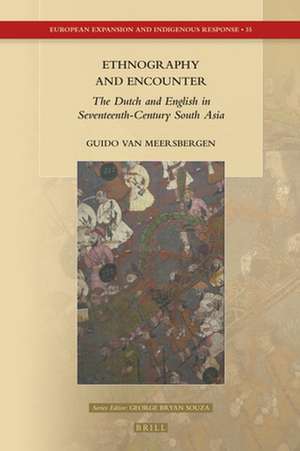Ethnography and Encounter: The Dutch and English in Seventeenth-Century South Asia: European Expansion and Indigenous Response, cartea 35
Autor Guido van Meersbergenen Limba Engleză Hardback – 20 oct 2021
Din seria European Expansion and Indigenous Response
- 18%
 Preț: 1655.82 lei
Preț: 1655.82 lei - 18%
 Preț: 647.60 lei
Preț: 647.60 lei - 18%
 Preț: 660.89 lei
Preț: 660.89 lei - 18%
 Preț: 843.90 lei
Preț: 843.90 lei - 18%
 Preț: 691.71 lei
Preț: 691.71 lei - 18%
 Preț: 611.05 lei
Preț: 611.05 lei - 18%
 Preț: 631.89 lei
Preț: 631.89 lei - 18%
 Preț: 673.09 lei
Preț: 673.09 lei - 18%
 Preț: 718.77 lei
Preț: 718.77 lei - 18%
 Preț: 615.35 lei
Preț: 615.35 lei - 18%
 Preț: 615.35 lei
Preț: 615.35 lei - 18%
 Preț: 544.45 lei
Preț: 544.45 lei - 18%
 Preț: 797.08 lei
Preț: 797.08 lei - 18%
 Preț: 907.04 lei
Preț: 907.04 lei - 18%
 Preț: 1608.58 lei
Preț: 1608.58 lei - 18%
 Preț: 697.03 lei
Preț: 697.03 lei - 18%
 Preț: 548.72 lei
Preț: 548.72 lei - 18%
 Preț: 690.15 lei
Preț: 690.15 lei - 18%
 Preț: 3264.45 lei
Preț: 3264.45 lei - 18%
 Preț: 577.99 lei
Preț: 577.99 lei - 18%
 Preț: 550.57 lei
Preț: 550.57 lei - 15%
 Preț: 508.92 lei
Preț: 508.92 lei - 18%
 Preț: 567.33 lei
Preț: 567.33 lei - 18%
 Preț: 528.02 lei
Preț: 528.02 lei - 18%
 Preț: 735.92 lei
Preț: 735.92 lei - 18%
 Preț: 600.53 lei
Preț: 600.53 lei - 18%
 Preț: 559.04 lei
Preț: 559.04 lei - 18%
 Preț: 536.26 lei
Preț: 536.26 lei - 18%
 Preț: 546.60 lei
Preț: 546.60 lei - 18%
 Preț: 625.24 lei
Preț: 625.24 lei - 15%
 Preț: 499.91 lei
Preț: 499.91 lei - 18%
 Preț: 624.36 lei
Preț: 624.36 lei - 18%
 Preț: 714.09 lei
Preț: 714.09 lei - 18%
 Preț: 818.40 lei
Preț: 818.40 lei - 18%
 Preț: 662.42 lei
Preț: 662.42 lei - 18%
 Preț: 668.33 lei
Preț: 668.33 lei - 18%
 Preț: 665.93 lei
Preț: 665.93 lei
Preț: 536.26 lei
Preț vechi: 653.97 lei
-18% Nou
Puncte Express: 804
Preț estimativ în valută:
102.61€ • 107.71$ • 85.17£
102.61€ • 107.71$ • 85.17£
Carte indisponibilă temporar
Doresc să fiu notificat când acest titlu va fi disponibil:
Se trimite...
Preluare comenzi: 021 569.72.76
Specificații
ISBN-13: 9789004471696
ISBN-10: 9004471693
Dimensiuni: 155 x 235 mm
Greutate: 0 kg
Editura: Brill
Colecția Brill
Seria European Expansion and Indigenous Response
ISBN-10: 9004471693
Dimensiuni: 155 x 235 mm
Greutate: 0 kg
Editura: Brill
Colecția Brill
Seria European Expansion and Indigenous Response
Cuprins
General Series Editor’s Preface
List of Maps and Illustrations
Abbreviations
Glossary
Acknowledgements
Introduction
1Ethnography and Encounter
2Company Writing
3The East India Companies in Seventeenth-Century South Asia
4Plan of the Book
1 Company Writing and Early Modern Ethnography
1Ethnography on Early Expeditions
2Instructions: Cordiality and Caution
3Civility and Barbarism
4Despotism
5Character and Complexion
6“Moors” and “Gentiles”
2 Writing Routines and the Making of Company Discourse
1‘Continuall and True Iournalls’
2The VOC’s Memoir for the Writing of Reports
3The Logic of Company Writing
3 Trade Relations and Representations: The EIC and VOC in Gujarat
1‘The Only Key to Open All the Rich and Best Trades’
2Brokerage and Trust
4 ‘No Thing but Feare Keepes a Moore in Awe’: Local Conflict and Quotidian Exchange
1Raids and Retaliations
2Mutual Accommodations and Quotidian Exchange
5 Ceremonies of Submission: Diplomacy in a Mughal Register
1Diplomacy and Mughal Court Culture
2The Companies and Khilʾat
3Diplomatic Communication and Self-Representation
6 Gratifying Mughal Tastes: Company Gift-Giving Strategies
1Local Tastes and Global Gifts
2Gifts and Interaction Ritual
3Gift-Giving and Ethnographic Discourse
7 ‘Safe Habitations’: Colonial Settlement in Ceylon and Madras
1‘Under Your Owne Command’: The Settling of Madras
2‘A Permanent Colony’: Establishing Dutch Power on Ceylon
8 Governing Pluriform Populations: Company Rule in an Asian Setting
1The Eic and Mestization
2Cultures of Governance: The Case of Madras
3Governing “Others”: Voc Rule on Ceylon
Conclusion
Bibliography
Index
List of Maps and Illustrations
Abbreviations
Glossary
Acknowledgements
Introduction
1Ethnography and Encounter
2Company Writing
3The East India Companies in Seventeenth-Century South Asia
4Plan of the Book
PART 1: Corporate Ethnography
1 Company Writing and Early Modern Ethnography
1Ethnography on Early Expeditions
2Instructions: Cordiality and Caution
3Civility and Barbarism
4Despotism
5Character and Complexion
6“Moors” and “Gentiles”
2 Writing Routines and the Making of Company Discourse
1‘Continuall and True Iournalls’
2The VOC’s Memoir for the Writing of Reports
3The Logic of Company Writing
PART 2: Accommodation and Conflict
3 Trade Relations and Representations: The EIC and VOC in Gujarat
1‘The Only Key to Open All the Rich and Best Trades’
2Brokerage and Trust
4 ‘No Thing but Feare Keepes a Moore in Awe’: Local Conflict and Quotidian Exchange
1Raids and Retaliations
2Mutual Accommodations and Quotidian Exchange
PART 3: Diplomacy and Cultural Exchange
5 Ceremonies of Submission: Diplomacy in a Mughal Register
1Diplomacy and Mughal Court Culture
2The Companies and Khilʾat
3Diplomatic Communication and Self-Representation
6 Gratifying Mughal Tastes: Company Gift-Giving Strategies
1Local Tastes and Global Gifts
2Gifts and Interaction Ritual
3Gift-Giving and Ethnographic Discourse
PART 4: The Birth of Company Settlements
7 ‘Safe Habitations’: Colonial Settlement in Ceylon and Madras
1‘Under Your Owne Command’: The Settling of Madras
2‘A Permanent Colony’: Establishing Dutch Power on Ceylon
8 Governing Pluriform Populations: Company Rule in an Asian Setting
1The Eic and Mestization
2Cultures of Governance: The Case of Madras
3Governing “Others”: Voc Rule on Ceylon
Conclusion
Bibliography
Index
Notă biografică
Guido van Meersbergen, Ph.D. (2015), UCL, is Assistant Professor in Early Modern Global History at the University of Warwick. He has published on the Dutch and English East India Companies, travel writing, and cross-cultural diplomacy in the early modern world.
